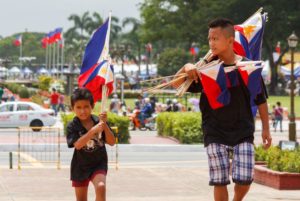National Anthem or Jailhouse Rock?
 The Philippines national flag for sale on the streets of Manila.
The Philippines national flag for sale on the streets of Manila. As opposed to the pledge of alliance, the majority of Americans are not required encouraged or pressured to sing “The Star-Spangled Banner” every day in public school. Either due to nerves, disinterest, or infrequency of singing the song, people sometimes forget or completely butcher the lyrics to America’s national anthem. Most of the time, it’s no big deal. When celebrities botch their rendition of “The Star-Spangled Banner,” which happens more often than you would think, audience members either whisper, laugh, or take a video of the performance and upload it to YouTube. The performer may be embarrassed but there are no major, life-altering consequences. Unfortunately, this is not the case in all parts of the world.
Last Monday the House of Representatives in the Philippines passed the “Revised Flag and Heraldic Code,” a revision of existing legislation requiring citizens to sing “Luipang Hinirang,” the Philippine national anthem, when it’s played in public. In addition to the newly mandated singing and standing, “the attending public shall sing the national anthem with fervor and shall be in accordance with the musical arrangement and composition of Julian Felipe within the range of 100 to 120 metronome in 4/4 beat when sang.” Yes, you read that correctly.
Simply standing and singing the Philippine national anthem is not enough. One must sing both on beat and with enthusiasm, yet the bill never defined how it would decide if a citizen sang “with fervor.” Another addition to the proposed bill states that the national anthem “shall be committed to memory by all students of both public and private educational institutions.” If this bill becomes a law, failure to sing the national anthem perfectly with fervor and tempo could result in a fine between 50,000-100,000 pesos, equivalent to $1,000-$2,000 or imprisonment for up to one year. Those who violate the law more than once will receive both jail time and a fine. The law is obviously ambiguous, however; it would be very difficult, unless you have a classically trained ear, to pick out that one tone-deaf individual at the ball game.
Over the past couple of years, several other countries like Japan, Russia, and India have enacted legal repercussions when citizens violate the etiquette related to their national anthems. While it’s not a criminal offense to quietly sit during “The Star-Spangled Banner,” individuals who do not participate are often stigmatized and labeled as unpatriotic. Remember the outcry and chaos that ensued last year when San Francisco 49ers quarterback Colin Kaepernick refused to stand during the national anthem as a sign of protest? Kaepernick succinctly stated, “I am not going to stand up to show pride in a flag for a country that oppresses black people and people of color.” Labeled as anti-American, disrespectful, whiny, and an indulgent crybaby by individuals and reporters, not only was Kaepernick’s career deeply impacted, (he’s currently a free agent with the NFL) but he also received multiple death threats.
While American citizens are not imprisoned if they sit out the national anthem, the reaction to Kaepernick’s decision operates in the same way as the proposed Filipino law. It punishes him for his expression of free speech. Kaepernick’s decision to speak out against the country’s oppressive actions should have received more support and respect, as it was a direct exercise of his First Amendment right—something that is vital to our democracy. I can only hope that the Philippine Senate strikes down this bill and the world soon enough realizes, as David Niose, director of the Appignani Humanist Legal Center perfectly stated:
Instilling patriotism is a political euphemism for manipulating public opinion, solidifying the authority of those in charge, and creating an environment that nurtures militarism and maximizes corporate profits, with little consideration of the resulting harm and destruction.
With our president under investigation, a harmful health care bill proposed, and a discriminatory travel ban not yet dead it may be hard for many US citizens this Fourth of July to enthusiastically sing about “the land of the free and the home of the brave.” Others may find it energizing to do so and some may even sing the “Star Spangled Banner” as a way to evoke a revolutionary spirit for their own resistance. Rather than brandish any of them as unpatriotic, it’s important to remember they’re exercising their rights and values as free citizens, exemplifying the vitality of our democracy.
